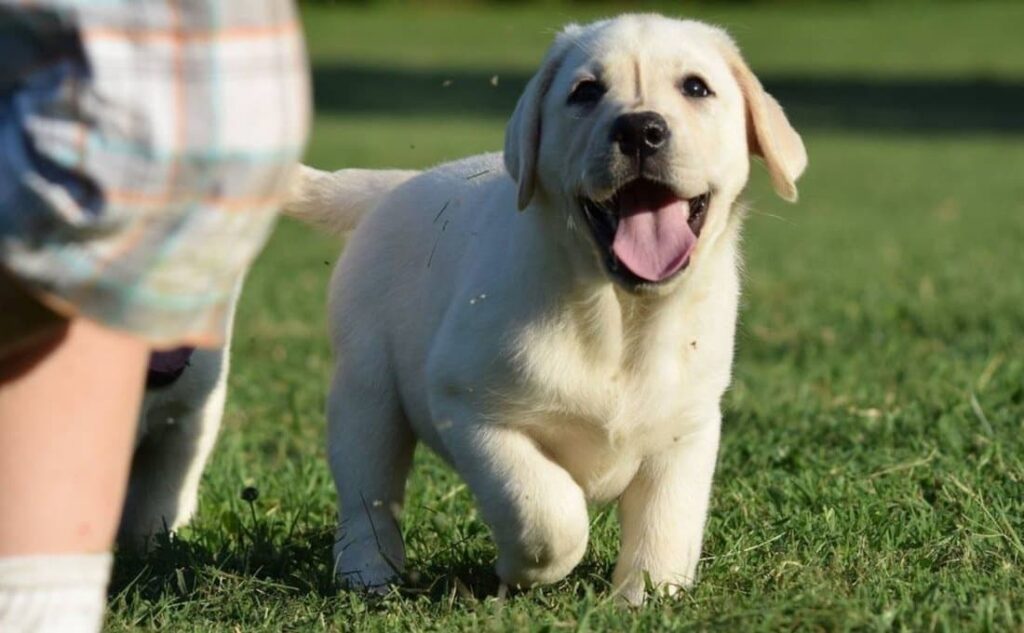Thinking about adding a new furry member to your family? Are you looking for a dog breed that's friendly, playful, and active? If you answered yes, then a Labrador is your ultimate dog.
This Labrador guide explains the history of the Labrador Retriever breed, characteristics, vital stats, personality, care, and general health of Labrador Retrievers.

Labrador Retriever History and Labrador Characteristics
The history of a Labrador Retriever dates back to the 1800s. English Labradors have a blockier head, a thicker coat, and a shorter and stockier build. They're known to be a bit calmer and laid back as compared to American Labradors. Take a look at the Labrador breed characteristics:
- A common characteristic of a Labrador dog is their loving and affectionate character. They crave companionship.
- They're friendly towards kids, strangers, and other pets.
- These dogs are a suitable option for novice pet parents.
- Labradors are moderately sensitive and hate to be alone.
- They have a high tolerance for extreme temperatures.
- They are generally healthy dogs with fewer hereditary issues.
- These dogs shed heavily and have high grooming requirements.
- Labradors are alert, intelligent, and easy to train dogs.
- They have a high playful potential.
- They are highly energetic dogs and need a lot of exercises.
Vital Stats About English Labradors
- Dog Breed Group- Sporting dogs
- Coat- Short double coat
- Coat Color- Black, Brown, Yellow
- Average Height- 21.5 - 23.5 inches (female), 22.5 - 24.5 inches (male)
- Average Weight Range- 55 - 70 pounds (female), 65 - 80 pounds (male)
- Energy Level- Very energetic
- Temperament- Active, intelligent, friendly, affectionate
- Origin- United Kingdom
- Life Expectancy- 10-12 years
American Labradors, in contrast, are generally taller and leaner with a more athletic build compared to their English counterparts. They are often bred for field trials and hunting, which results in a higher energy level and a more driven temperament. American Labs are particularly well-suited for working roles and active lifestyles.
Labrador Retriever Personality Traits and Temperament
Labradors often share similar personalities. Here are common Labrador Retriever traits:
- Loyal: The history of Labrador dogs proves they are very loyal to the family. No matter what happens in your life, English Labradors will remain by your side.
- Affectionate: The Lab Retriever personality is friendly and affectionate. They make superb family dogs.
- Playful: Labrador Retrievers are playful dogs. They love playing with their human companions.
- Intelligent: Labradors are intelligent and smart dogs.
- Non-aggressive: Labs are gentle and not at all aggressive. The English Lab temperament makes them perfect for families with children and other pets.
Like all dogs, Labrador retriever character is affected by many factors, including heredity, training, and socialization. Notably, American Labradors typically have higher energy levels compared to the more laid-back English Labradors, making them better suited for active roles and environments.

Labrador Puppy Behavior
Labrador puppies are bundles of energy and curiosity. They are incredibly playful and enthusiastic about exploring their environment. This stage is crucial for socialization and basic training, as puppies are highly impressionable. They may exhibit behaviors such as chewing on furniture and playful nipping, which can be managed with proper guidance and patience. Their exuberance and eagerness to learn make them a joy to train, as long as consistent and positive reinforcement methods are used. Early training helps to shape their behavior and establish good habits that will last a lifetime.
Adult Labrador Behavior
As Labradors mature into adulthood, their behavior tends to stabilize. Adult Labs are known for their balanced temperament, combining playfulness with a more settled demeanor. They remain active and enjoy regular exercise, which is essential for their physical and mental well-being. Adult Labradors are highly trainable, responsive to commands, and eager to please their owners. They thrive on companionship and may exhibit signs of separation anxiety if left alone for extended periods. With their intelligence and loyalty, adult Labs often excel in roles such as service dogs, therapy dogs, and search-and-rescue operations.
Senior Labrador Behavior
Senior Labradors, typically those over seven years old, tend to slow down and become more relaxed. They may not have the same level of energy as in their younger years but remain affectionate and loyal companions. It's important to adapt their exercise routine to their age, ensuring they stay active without overexertion. Senior Labs might experience health issues such as arthritis or reduced mobility, so regular veterinary check-ups are crucial. Despite the physical changes, their loving and gentle nature persists, making them wonderful pets throughout their golden years.
Acquiring a puppy from a reputable breeder can streamline puppy training and prevent or mitigate unwanted behaviors.
Labrador Dog Health Issues
If you own or are planning to buy a Labrador Retriever, you need to be aware of common Labrador health concerns. Labradors are generally healthy but are prone to certain diseases. Let’s have a look into the leading Labrador Retriever health concerns:
- Ear Infections
- Hip Dysplasia
- Elbow Dysplasia
- Epilepsy
- Allergies
- Diabetes Mellitus
- Progressive Retinal Atrophy (PRA)
- Hypothyroidism
Labrador Care
Here's how you can take care of your Labradors:
Feeding Your Labrador Retrievers:
Diet and nutrition are important for your Labrador's health and overall well-being. Here are some feeding tips for your Labrador Retriever:
- Your Labrador should have a healthy and varied diet.
- Feed your dog a protein-rich diet needed for their active lifestyle.
- Provide your Labrador Retriever with high levels of omega-3 and omega-6 fatty acids.
- Avoid excess amounts of grain-heavy foods.
- The amount of diet should be according to your Lab's size, weight, and activity level.
Training Your Labrador Retriever:
Labradors are intelligent and easy to train dogs. They can fairly understand your commands and are quite eager to learn new things.
Training can be a great experience for you and your Labrador puppy. Here are some tips for training your Labradors:
- Form a bond and gain trust with your Labrador.
- Start socializing your dog right from puppyhood.
- Challenge their mind and prevent boredom.
- Start training your Lab in a controlled environment with minimum distractions.
- You need to be consistent and firm with your pup.
- Train them using positive reinforcement techniques.
If you have long working hours and are unable to devote much time, it’s better to enroll your Labrador puppy in puppy classes.
Grooming Needs of Labradors:
Labradors are low shedders and are considered hypoallergenic dogs. However, they require routine grooming depending on the length and type of coat. Let’s have a look at Labrador Retrievers’ grooming needs:
- Brushing: Labradors require regular brushing twice or thrice a week.
- Bathing: Labrador Retrievers don't have a doggy odor and just need a few baths a year. Use warm water and a high-quality dog shampoo and conditioner.
- Ear cleaning: Ears should be examined and thoroughly cleaned weekly. Labrador's ears should smell good with no exceptional amount of wax.
- Teeth cleaning: Brush your Labrador's teeth at least two or three times a week with pH-balanced ear cleaner. This will remove tartar buildup and bacteria and prevent gum infections.
- Nail trimming: Trim your Labrador's nails regularly. Short and neatly trimmed nails keep your dog's paws in good condition.
Labradors have a double coat, which sheds moderately throughout the year and more heavily during seasonal changes, often referred to as "blowing" their coat. Regular grooming helps manage this shedding and keeps their coat healthy. The Labrador personality is docile, so they can become accustomed to grooming when they are a puppy. Grooming should be a positive experience for your Labrador Retrievers, filled with praises and rewards.
Exercise Requirements of Labradors:
Labradors are intelligent dogs and can get bored easily. They're high-energy dogs and need exercise to stay fit and healthy. They require around 30 - 60 minutes of exercise per day. You can meet Labs' exercise requirements by:
- Taking them for a walk
- Playing fetch and frisbee toss
- Free play in a fenced yard
- Taking them jogging
- Playing tug of war
- Agility training
When exercising Labrador puppies, aim for about five minutes of activity per month of age, up to two times a day, until they are fully grown. As they age, their stamina will gradually build, allowing for more extended and vigorous play sessions.
How Do Labrador Retrievers Relate With Children and Other Pets
The Labrador dog personality is generally non-aggressive and loving. A well-trained Labrador will always be good with children and other pets. These amazing dogs are incredibly affectionate and gentle around kids. However, small kids should never be left alone with any dog. Labradors are known to be friendly around other dogs and pets.

Final Thoughts
If you’re looking for a gentle, patient, yet, highly active breed, then a Labrador Retriever is a great option. With proper care and attention, these dogs can make great family pets. A well-trained Labrador is a true joy!
Hope you enjoyed reading this Labrador guide! Feel free to share your thoughts and questions. We would be happy to hear from you!
